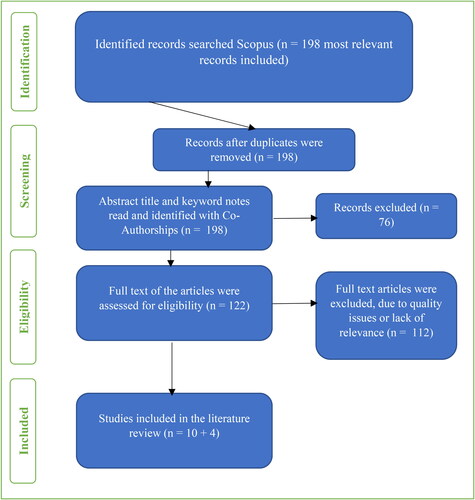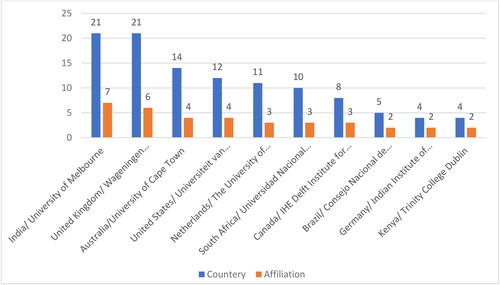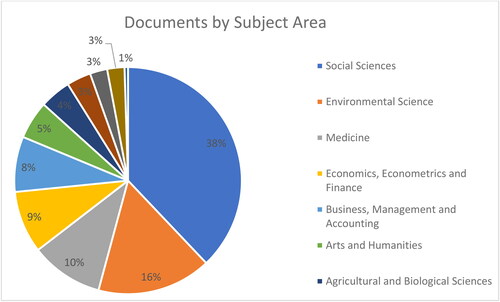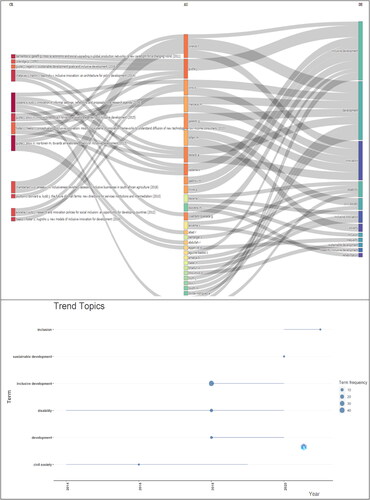Abstract
This study aims to identify, review, and study trends in scientific publications on organizational ecosystems for inclusive development in Indonesia. This study examines how organizations can address issues of diversity, equity, and inclusion (DEI), in order to make a significant difference internally and externally in Indonesia. This study identifies, reviews, and determines the different discussions and literature regarding the extent to which organizations can address DEI issues to promote inclusive development policies in Indonesia. To evaluate how the organizational ecosystem considers the concept of inclusive development in Indonesia, this research also explores trends in how organizations engage and relate in promoting inclusive development. This study identified several factors that should be considered to promote inclusivity in various countries, including Indonesia. These factors include: (1) establishing appropriate institutional governance arrangements; (2) ensuring proper planning and development; (3) fostering a shared understanding of the technical term ‘sharing economies’ to facilitate sustainable and inclusive development; (4) comprehending the framework of the inclusive development process; (5) utilizing information and communication technology (ICT) in a user-friendly manner for the community; and (6) implementing diverse multi-level approaches, if necessary, in the inclusive development process. This research provides guidance to the Indonesian government in creating a just, equal and inclusive organizational climate and encourages inclusive development in several areas that are still exclusive.
REVIEWING EDITOR:
Introduction
Development and economic growth must be able to make a significant contribution to poverty alleviation efforts and equitable development (Perera & Lee, Citation2013; Shaikh, Citation2017). Therefore, economic development must be carried out in a sustainable and inclusive manner (Annahar et al., Citation2023; Arce, Citation2019; Fay, Citation2012; Gumede, Citation2018). Global development in recent years has seen more exclusive development due to the fact that the benefits of development have not yet been felt by vulnerable groups (Kleibert, Citation2018; Nassani et al., Citation2019). As stated by Grinin et al. (Citation2023) currently modern society is trapped in exclusive development problems because it is faced with the challenges of high world population levels, economic slowdown, pension crisis, vulnerability of the elderly, problems caring for people with disabilities and the weak. Not much different from what was said by Planas-Carbonell et al. (Citation2023), the benefits of development are currently felt more by rich groups than by vulnerable groups. Development which only focuses on aspects of economic growth as their only goal sometimes leads to a condition where there is high economic growth without equal distribution of welfare accompanied by high unemployment, high poverty rates, and a widening gini ratio, as well as the carrying capacity of the environment which is continuously being degraded as a result of the development process (Abdillah et al., Citation2022; Gupta & Vegelin, Citation2016; Kleibert, Citation2018; Kuri, Citation2009; McIntyre-Mills et al., Citation2023; Widianingsih et al., Citation2023).
Many groups are excluded from development because of gender, ethnicity, age, disability or poverty (Gupta & Vegelin, Citation2016; Kleibert, Citation2018; Kuri, Citation2009). Development inequality is clearly the effect of this exclusive development model (Gupta & Vegelin, Citation2016; Kleibert, Citation2018; Kuri, Citation2009). Inclusive development which also reduces poverty levels can only be realized if all parties contribute to creating equal opportunities, sharing the benefits of development, and providing the widest possible space for participation in decision-making; entirely based on respect for the values and principles of human rights, and also principles that are participatory, non-discriminatory, and accountable (Arce, Citation2019; Fay, Citation2012; Gumede, Citation2018; Gupta & Vegelin, Citation2016; McIntyre-Mills et al., Citation2023).
The importance of the organizational ecosystem in realizing inclusive development is due to the need for equitable development, to equitable development in various countries (Gaviglio et al., Citation2023; Hameed et al., Citation2023). So, to realize perfect development and harmonize the mission of just development, various perspectives and leadership roles are needed in overcoming disparities in wealth and development in various places (Adhikari & Shrestha, Citation2023; Brauckmann et al., Citation2023).
The phenomenon of inclusivity in Indonesia can be seen from the fact that Indonesia has ratified the United Nations (UN) Convention on the Rights of Persons with Disabilities (CRPD) in 2011 and passed Law (UU) No. 8 of 2016 concerning Persons with Disabilities. However, until now vulnerable groups in society (such as persons with disabilities) are still being sidelined in the design and implementation of national development. In the last three years, Indonesia has not succeeded in carrying out inclusive development for vulnerable groups. They have yet to receive justice and equality in development such as receiving space for participation, and respect for values and principles of human rights, and also principles that are participatory, non-discriminatory, and accountable (Abdillah, Widianingsih, Buchari, & Rusliadi, Citation2023; Aturkian Laia, Citation2022; Putri & Halim, Citation2023; Susetiawan & Milda, Citation2022). The barriers are found in various levels, ranging from individuals to society, including formal and informal institutions (Aturkian Laia, Citation2022; Ibda & Wijanarko, Citation2023; Putri & Halim, Citation2023; Susetiawan & Milda, Citation2022).
Therefore, according to White and White (Citation2022) in order to create healthier societies, healthier communities, healthier nations, and healthier economies, we must find ways to be closer to the poor and vulnerable. At the very least, we can find meaningful, collective, and institutional ways to embrace vulnerable communities and encourage inclusive development. Therefore, institutional approaches and organizational ecosystems are more recommended in encouraging inclusive development (Aminullah et al., Citation2022; Shakiba et al., Citation2023; White & White, Citation2022). Because change will only happen if people are willing to do things that are uncomfortable and difficult. This only happens when good people put themselves in a tough place, and they stand witness.
Another important thing is if someone is in a position to make a difference in society, then the leader becomes an important role model for his generation (Shakiba et al., Citation2023; White & White, Citation2022). It can be said that the organizational ecosystem plays an important role in society as an engine of creativity, innovation, and opportunities for development (Shakiba et al., Citation2023; Smith et al., Citation2018; White & White, Citation2022). The success of long-term development in Indonesia depends on a healthy, fair, and equal organizational ecosystem so as to provide a sense of security and comfort for every element within it.
This study examines how organizations can deal with issues of diversity, equality, and inclusion, to encourage inclusive development in Indonesia through various literature that have developed in the world. Understanding what White and White (Citation2022) stated, where inclusive organizational ecosystems have the power to build stronger and more diverse ecosystems for all stakeholders: society, markets, governments, communities, and the private sector. An organizational ecosystem that promotes the same values that are fair and humanizes people, eliminates bias and racism, and ensures fairness and equality for all, will make a strong impact. Dismantling longstanding systems of inequality will take time, but will help lay the groundwork for a new paradigm of equality (Shakiba et al., Citation2023; White & White, Citation2022).
Methods
Ethics statement
Neither approval by the institutional review board nor obtainment of informed consent was required since this was a literature-based study.
Study design
In our study, we implemented three stages of analysis. The first phase consisted of a bibliometric analysis, supplemented by a review of highly cited relevant publications. In the second stage, we map and analyze of the development of research topic trends based on co-occurrence/research keywords that can be utilized/studied by future researchers regarding organizational ecosystems in inclusive development. During the third stage, we present various literature related to this study and contextualize the relationship between organizational trends and developing inclusive development and issues of inclusivity in Indonesia. Bibliometric methods, which are generally quantitative, offer a macro lens for descriptive inquiry, research profiling, or scientific mapping techniques such as citation analysis, analysis of authorship, and analysis of words shared across the literature (Abdillah, Widianingsih, Buchari, & Nurasa, Citation2023; Muhtar et al., Citation2023). However, they usually lack a micro perspective aimed at understanding existing discussions and debates related to the topic or field of study. As such, bibliometrics should be used in conjunction with a literature review to maximize synergies and provide appropriate research triangulation (Abdillah, Widianingsih, Buchari, & Nurasa, Citation2023; Muhtar et al., Citation2023). We are very interested in capturing publications that focus on issues of diversity, equity, and inclusion, in order to promote inclusive development in Indonesia. We found this in the keywords: (1) ‘organi*’ AND ‘inclusive development’; and (2) TITLE-ABS-KEY (‘organi*’ AND ‘inclusive development’ AND ‘indonesia’) pada database Scopus. We focus on the Scopus database presenting patent data from many studies around the world. Scopus also provides services that function to assess the impact of a journal, whether it has a significant impact or not, so this is an advantage of Scopus.
Tools used: (1) scopus.com/search/(Analyze search results); (2) Chart & SmartArt (within Microsoft Word); and (3) VOSviewer. The Scopus database is utilized using the search strings ‘inclusive organizations and development’ and ‘inclusive and Indonesian organizations and development’ which cover a wide range of topics related to the ecosystem of organizations in inclusive development. As a result, there were 198 documents published from 1996 to March 2023. In the next stage, we carried out screening based on the suitability of the title and abstract, so we got 122 documents from 198 documents. At this stage we carry out due diligence on documents based on criteria; relevance to the topic, conciseness of documents (title, abstract, research objectives, research focus and research contribution, methods, results and discussion, to conclusions and research limitations), and research consistency until 10 + 4 documents were obtained (112 out of 122 documents were excluded). The next step was to assess the document relevance and analyze it according to the research procedure in .
Data analysis
Analysis of this research data through the keywords TITLE-ABS-KEY (‘organi*’ AND ‘inclusive development’) AND (LIMIT-TO (DOCTYPE, ‘ar’)) AND (LIMIT-TO (LANGUAGE, ‘English’)) AND (LIMIT-TO (SRCTYPE, ‘j’)) through the Scopus database. All search result data is stored in a CSV (Excel) file which is then processed and checked using the VOSviewer program version 1.6.17. VOSviewer is a tool for displaying and analyzing trends in bibliometric maps (Van Eck & Waltman, Citation2010). The program can display and describe a bibliometric visual map with unique data by identifying and analyzing the types of analysis that can be visualized in VOSviewer, as shown in .
Figure 2. Research data type Analisis Bibliometrics in VOSviewer. Source: Processed from various sources, 2023.

In the initial stage (in ), we carried out co-authorship (in Top 10 Subject Areas; Top 10 Countries and Top 10 Affiliates; Top 10 Authors; Top 10 publisher/source; Trends of publications) identification and analysis on all scientific documents obtained which were intended to look at trends and scales developing in the world regarding the Organization Ecosystem for Inclusive Development in Indonesia in the Scopus database. In the second stage, we carried out co-occurrence (clusters of research topics; Three Field Plot; and Treemap) identification and analysis intended to look at clusters and mapping and interconnectedness of concepts regarding the Organization Ecosystem for Inclusive Development in Indonesia. Then we carried out a systematic review of the 14 documents most relevant to this research.
Results – bibliometric study
At this early stage, a total of 198 documents accessed in March 2023 on inclusive organization and development were mapped and analyzed according to research trends from publication search results in the Scopus database. Each data or study is displayed, then identified and analyzed through analyze search results from scopus.com. The data is visualized based on: (1) Documents by year; (2) Documents by source; (3) Documents by authors; (4) Documents by country/territory & Documents by affiliation; and (5) documents by subject area.
CO-authorship analysis
The following is a presentation of trends and the results of publications by various world researchers regarding TITLE-ABS-KEY (‘organi*’ AND ‘inclusive development’) AND (LIMIT-TO (DOCTYPE, ‘ar’)) AND (LIMIT-TO (LANGUAGE, ‘English’)) AND (LIMIT-TO (SRCTYPE, ‘j’) which were in the Scopus database from 1996 to March 2023:
shows the trend of ‘Documents by year’, which published various studies on inclusive organization and development seen from 1996 to March 2023. The publication trend increased dynamically from year to year. Until March 2023 there were 123 documents published in the Scopus Database. It can be said that the number of studies published on Scopus continues to increase every year, showing that the topic of inclusive organizations and development is also a concern for various global researchers. This is in line with the trend of inclusive development issues in the last 10 years being widely discussed in cases of public organizations such as governments, including in Indonesia. Research from Lakitan et al. (Citation2019), Sloman and Margaretha (Citation2018), Mörchen et al. (Citation2018), and Untari and Vellema (Citation2022) explain the relationship between organizations in inclusive development in overcoming development and inclusiveness problems in various regions in Indonesia.
Figure 3. Publication trends based on the quantity of documents regarding (‘organi*’ AND ‘inclusive development’) in 1996 – March 2023 in the Scopus Database.
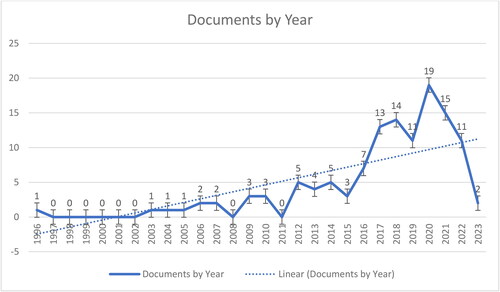
shows that of the 123 documents published in Scopus from 1996 to March 2023 were published in various indexed journals such as: (1) European Journal Of Development Research (Q1 by Springer Nature); (2) Environmental Management (Q1 by Spiringer Nature); (3) Environment And Planning A (Q1 by SAGE); (4) Development Policy Review (Q1 by Wiley-Blackwell); (5) Sustainability Switzerland (Q1 by MDPI); (6) Journal Of International Development (Q2 by Wiye-Blackwell); (7) Innovation And Development (Q1 by Taylor & Francis); (8) Disability And Society (Q1 by Taylor & Francis); (9) Development in Practice (Q2 by Taylor & Francis); (10) Disability Cbr And Inclusive Development (Q4 by Asia Pacific Disability Rehabilitation Journal). These journals are the best quality journals that publish many topics concerning organization and inclusive development. also presents the top 10 authors in the Scopus Database who write and study about organization and inclusive development.
Figure 4. Top 10 publisher/source that most often published articles concerning (‘organi*’ AND ‘inclusive development’) in 1996 – March 2023 in the Scopus Database.
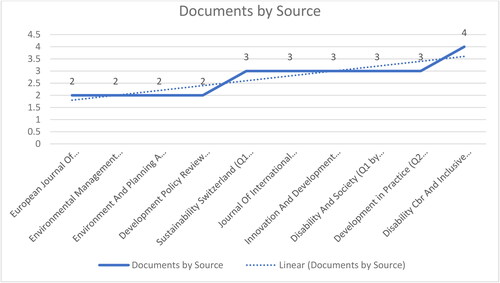
Table 1. Documents by authors.
. presents the Top 10 Authors who published various documents regarding (‘organic*’ AND ‘inclusive development’) in 1996 – March 2023 in the Scopus Database.
shows that the top 10 countries and top 10 affiliations with the most published documents on organization and inclusive development are as follows: (1) India with a total of 21 documents and the University of Melbourne with 7 documents; (2) United Kingdom with a total of 21 documents and Wageningen University & Research with 6 documents; (3) Australia with a total of 14 documents and the University of Cape Town with 4 documents; (4) United States with a total of 12 documents and Universiteit van Amsterdam with 4 documents; (5) Netherlands with a total of 11 documents and The University of Manchester with 3 documents; (6) South Africa with a total of 10 documents and Universidad Nacional de Quilmes with 3 documents; (7) Canada with a total of 8 documents and IHE Delft Institute for Water Education with 3 documents; (8) Brazil with a total of 5 documents Consejo Nacional de Investigaciones Científicas y Técnicas with 2 documents; (9) Germany with a total of 4 documents and the Indian Institute of Technology Kharagpur with 2 documents; and (10) Kenya with a total of 4 documents and Trinity College Dublin with 2 documents.
shows the top 10 publication subject area which contain documents on inclusive organization and development topics published from 1996 to March 2023. In research issues, fields of study such as Social Science are the most researched fields with 38 percent of articles, then Environmental Science with 16%, Medicine with 10%, Economics, Econometrics, and Finance with 9%, Business, Management, and Accounting with 8% percent, Arts and Humanities with 5% percent, and Agricultural and Biological Sciences with 4% percent. Therefore, the subject area on the topic of inclusive organization and development is in the fields of social science, and also environmental science, although they are also related to various subject areas. Based on this, to be able to learn correctly about the topic of inclusive organization and development it is also necessary to consider various perspectives in various scientific fields.
Mapping the development of research topics and issues regarding organizational ecosystems in inclusive development – a literature review
A total of 198 documents accessed in March 2023 regarding inclusive organization and development were mapped and analyzed according to research trends from publication search results in the Scopus database. Where each data or study is displayed, then identified and analyzed using VOSviewer version 1.6.17. The data is visualized following the calculated weights and identified according to suitability in this study. We also choose not to display data visualizations on other less relevant items. This presentation also shows that the problem of inclusive organizational and development ecosystems in various parts of the world is different. Below we identify various studies on organizational ecosystems for inclusive development. We have identified the study focus as shown in .
Co-occurrence analysis
shows various topics related to the study of organizations in inclusive development. Each cluster can be used as a reference for research issues and as a perspective for building research that provides theoretical and practical contributions to ongoing research. In addition, this research problem can be used as research data to see what research trends around world, and what might be studied further. You can also see how research trends on organizational ecosystems support inclusive development.
Figure 7. Several clusters of research topics regarding organizational ecosystems in inclusive development (network visualization). Source: Processed by the authors, 2023.
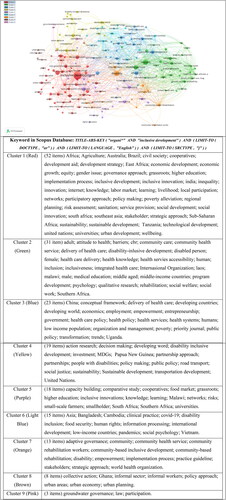
presents a Three-Field Plot (Sankey Diagram) which lists the authors (center), Author Keywords (right side), and Cited References (left side). The keyword analysis in the visualization reflects the theme and direction of writing regarding organizational ecosystems and inclusive development. In addition, identification and analysis of research topic trends concerning organizational ecosystems in inclusive development with author’s keywords from 1996 to March 2023 (see ). Trend Topics () shows that there are 6 keywords that are most often used related to organizational ecosystem issues in inclusive development, namely: (1) inclusive development (term frequency: 40/2018); (2) disability (term frequency: 11/2018); (3) development (term frequency: 7/2018); (4) civil society (term frequency; 5/2016); (5) sustainable development (term frequency: 5/2020); and (6) inclusion (term frequency: 5/2021). The emergence of these topics is most related to organizational ecosystem issues and inclusive development (for details, see ).
Discussions – findings
In the final section of this literature review study, we explored and studied various literature that contextualize organizational issues, inclusive development, and issues of inclusivity around the world and in Indonesia. We present the Top 10 documents with the most citations as well as the most referenced documents on the topic of organizational ecosystems in inclusive development with the keywords ‘organic*’ AND ‘inclusive development’ in Scopus (see ). We also added 4 Top documents on the topic of organizational ecosystems in inclusive development in Indonesia as shown in .
Table 2. Top 10 documents on organization ecosystem for inclusive development.
shows that some literature has explained the relationship between organizations in inclusive development in addressing development issues and inclusiveness in various regions, such as Swyngedouw, (Citation2005) suggests that innovative governance arrangements are increasingly being recognized as a potential field significantly to promote inclusive development processes. Frederiksen (Citation2018) also suggests that organizations (in CSR activities) are more likely to be subject to large investments than to encourage large inclusive development. Mercer (Citation2006) argues that building facilities such as infrastructure for internet access is an inclusive development tool that can be used in modernization strategies in various vulnerable areas. Davies et al. (Citation2017) argue that to promote sustainable and inclusive development in the world. It is therefore necessary to build common understanding in order to understand the various ‘sharing economies’ and require further attention. Obeng-Odoom (2017) suggests that progress and drivers of growth, poverty alleviation, and inclusive development need to be framed with appropriate governance instruments. Tashobya et al. (Citation2014) argue that an inclusive development process is one of the main attributes in the HSPA (Health systems performance assessment) framework. Friederici et al. (Citation2017) argue that inappropriate development programs have very unequal economic impacts in terms of internet connectivity across geographies and social strata in various regions. Sahraoui (Citation2007) argues that e-inclusion provides a good platform for demonstrating the inadequacy of the main mechanistic approach to e-government. Aguirre-Bastos and Weber (Citation2018) propose a new, interconnected multilevel approach that contains two elements of policy making to support innovation for inclusive development. While Sachs (Citation2004) shows that globalization as the spirit of development in the era of modernism has benefited only a few insiders and left many outsiders behind. Based on the various literature reviews, to create an organizational ecosystem for inclusive development, it is necessary to pay attention to matters such as: (1) establishing appropriate institutional governance arrangements; (2) ensuring proper planning and development; (3) fostering a shared understanding of the technical term ‘sharing economies’ to facilitate sustainable and inclusive development; (4) comprehending the framework of the inclusive development process; (5) utilizing information and communication technology (ICT) in a user-friendly manner for the community; and (6) implementing diverse multi-level approaches, if necessary, in the inclusive development process.
In the Indonesian context, there were 4 search results documents using the keywords TITLE-ABS-KEY (‘organi*’ ‘inclusive development’ AND ‘indonesia’), in order to understand the partnership model of Public Organizations in Inclusive Development in Indonesia, we can observe .
Table 3. Top 4 documents on ecosystem organization for inclusive development in Indonesia.
Based on the literature review in , it can be seen that the institutional role in promoting inclusive development in Indonesia is very important. As stated by Lakitan et al. (Citation2019) there are obstacles in the development process of increasing productivity and planting intensity on non-paddy fields in South Sumatra, Indonesia. This can be attributed to the fact that there are social and institutional constraints that make public policy not lead to a significant increase in farmer motivation. Sloman and Margaretha (Citation2018) suggest that the WGQ (Washington Group of Questions on Disability) concept is a practical tool for DRR (Disaster Risk Reduction) and humanitarian action actors need to support the identification of persons with disabilities and plan initiatives and services that are inclusive and accessible to the majority of the at-risk population in Indonesia. Mörchen et al. (Citation2018) argues that proper information management can promote inclusive development in various countries, including Indonesia. Untari and Vellema (Citation2022) argue that it is necessary to ensure the prerequisites for inclusiveness in management and management in organizations. Based on this study, it can be seen that the problem of inclusivity in Indonesia is not much different from what was shown in the previous study (see ). Several things need to be considered in encouraging inclusive development in Indonesia, namely: (1) institutional governance arrangements; (2) proper development program planning; (3) understanding the framework in an inclusive development process; and (4) implementing various multi-level approaches if needed in an inclusive development process.
Therefore, based on the urgency of the issue in regarding ecosystem organization for inclusive development which has become the attention of various researchers worldwide, both in the case of inclusiveness in Indonesia and the World. So the interrelationship of various development elements needs to be taken into account by various important factors, such as when launching development programs, frameworks and development processes in order to create inclusive economic growth and development. Apart from that, it is also hoped that poverty and further development inequality can be avoided. The situation in Indonesia still ignores various principles of inclusive development, especially in various development programs (Gunawan et al., Citation2020; Holzhacker et al., Citation2015; Lakitan et al., Citation2019). So there is an increase in poverty, inequality and social injustice in Indonesia (Hornok & Raeskyesa, Citation2023; Nizar et al., Citation2023; Sugiharti et al., Citation2023). The main inclusive development strategy for these various problems is the need to encourage the creation of productive and profitable employment, the provision of effective and efficient social safety nets to protect those who are unable to work or who receive too few development benefits, improving basic public services and supporting public policies that adequate.
Table 4. Comparison of the urgency of issues in organizational ecosystems for inclusion in Indonesia and globally.
Research implication
This study highlights that the role of institutions or organizations in building inclusivity is vital. This has also become the attention of various researchers worldwide, both in the case of inclusivity in Indonesia and the world. Like, it has several challenges such as competency and management that are not contextual. The situation in Indonesia still ignores various principles of inclusive development, especially in various development programs, so it is hoped that poverty and subsequent development inequality can also be avoided. We highlight that the government or public organization authorities must pay attention to important factors in inclusive development, such as when launching development programs, frameworks, and processes to create inclusive economic growth and development.
Conclusions
Today’s development goals must be directed at creating healthier societies, healthier communities, healthier nations, and healthier economies. Therefore, we must find ways to reach out and help the poor and vulnerable. This can be done by finding meaningful, collective, and institutional ways to embrace vulnerable communities and promote inclusive development. The fundamental objective of evaluating the literature on ‘organizational ecosystems and inclusive development’ is to understand the development of studies on how organizations can address issues of diversity, equity, and inclusion, with the of of promoting inclusive development. VOSviewer is considered an outstanding scientific data visualization and mapping tool. Today, this technology is essential for tracking research trends and progress. With the rapid release of publications and research results which leads to an explosion of data that far exceeds the normal ability to conduct large systematic reviews on a regular basis. This does not mean that this technique should not be used for a thorough review. In addition, new software tools such as machine learning and internet of things (IoT) are complementing topic-specific knowledge not currently available for in-depth research. It can be seen that the institutional role in promoting inclusive development is very important. Therefore, it is necessary to pay attention to the relationship between the various elements of development when launching development programs to create inclusive economic growth and development. Besides that, it is also hoped that further poverty and development inequality can be avoided.The situation in Indonesia, where the principles of inclusive development are still being ignored, especially in various development programs. Which leads to an increase in poverty, inequality, and social injustice in Indonesia. The rapid increase in publications concerning this theme has been seen since 1996 which has continued to increase until March 2023 in various major world publishers and various multi-disciplinary disciplines.
The literature review found several main themes and criteria through the VOSviewer software. The emerging themes include: adaptive management; agriculture; civil society; cooperatives; development aid; development strategy; economic development; economic growth; equity; gender issues; governance approaches; grassroots; higher education; implementation process; inclusive development; inclusive innovation; inequality; innovation; Internet; knowledge; labor market; learning; livelihood; local participation; networks; participatory approach; policy making; poverty alleviation; regional planning; risk assessment; sanitation; service provision; social development; and social innovation. At the same time, trending topics regarding inclusive organization and development such as world health organizations, disabled persons, innovation, social inclusion, empowerment are topics that have been discussed so far. From various literature discussions discussing inclusive organization and development, it was found that there are things that need to be considered to encourage inclusiveness in various countries, including in Indonesia, such as: (1) establishing appropriate institutional governance arrangements; (2) ensuring proper planning and development; (3) fostering a shared understanding of the technical term ‘sharing economies’ to facilitate sustainable and inclusive development; (4) comprehending the framework of the inclusive development process; (5) utilizing information and communication technology (ICT) in a user-friendly manner for the community; and (6) implementing diverse multi-level approaches, if necessary, in the inclusive development process.
Suggestions of practical and policies in this study where the government development program is implemented as a development model for local economic development, with full involvement of the role of government, the business sector, and civil society. This model is translated into program interventions including: strategic studies of regional economic potential, participatory development of planning documents and agreements, development of multi-stakeholder forums, public policy advocacy needed to build an inclusive development climate and support for small and medium enterprises (especially those based on utilization natural resources).
Our literature analysis is limited in two ways. First, the literature search was based only on the Scopus database source and analyzed using the VOSViewer software. Second, our subjectivity shapes our personal and professional perspectives so that the potential for subjectivity in this study still exists. Despite these limitations, our bibliometric scoping review shows that the trend of organizational ecosystem knowledge and inclusive development in Indonesia is a necessity, both in policy and practice. Finally, we see the need for inclusive development program planning and policy-making in Indonesia. Given the issue of planning priorities and inclusiveness policies in the development process in Indonesia, is still viewed as inferior when compared to economic and political considerations.
Authors’ contributions
Conceptualization, H. N., A.A., and I.W.; Supervision, H.N. and I.W. methodology, software, machine learning, and prediction, A.A.; data curation, Investigation, writing—original draft preparation. A.A., Q.M.A., I.W., and H.R.; writing—review and editing. A.A., Q.M.A., I.W., and H.R. All authors were equally involved in analyzing and editing the paper. All authors read and approved the final manuscript.
Disclosure statement
The authors declare that they have no known competing financial interests or personal relationships that could have appeared to influence the work reported in this paper.
Additional information
Funding
Notes on contributors
Heru Nurasa
Heru Nurasa is a Lecturer at the Department of Public Administration, Faculty of Social and Political Sciences, Padjadjaran University, Indonesia. His research is related to Dynamic Systems, Public Organizations, and Public Management.
Abdillah Abdillah
Abdillah Abdillah is a Doctoral Student and Assistant Professor in the Administrative Sciences Programme, Faculty of Social and Political Sciences, Universitas Padjadjaran, Bandung, Indonesia. His research interests relate to Local Government Studies, Climate Change Governance, Urban Resilience, Artificial Intelligence in Government, and Local political.
Qinthara Mubarak Adikancana
Qinthara Mubarak Adikancana is an Assistant Professor at the Department of International Relations, Universitas Padjadjaran, Indonesia. His research interests relate to food Security, System dynamic International Development issues, and Higher Education Governance.
Ida Widianingsih
Ida Widianingsih is a Professor at Public Administration Department and Vice Dean for Learning, Student, and Research Affairs of the Faculty of Social and Political Sciences, Universitas Padjadjaran, Indonesia. Her research interests relate to public administration and development issues, inclusive development policy, and participatory governance.
References
- Abdillah, A., Widianingsih, I., Buchari, R. A., & Nurasa, H. (2023). Implications of urban farming on urban resilience in Indonesia: Systematic literature review and research identification. Cogent Food & Agriculture, 9(1), 2216484. https://doi.org/10.1080/23311932.2023.2216484
- Abdillah, A., Widianingsih, I., Buchari, R. A., & Rusliadi, R. (2023). Collaborative communication models in non-cash food assistance (Bantuan Pangan Non-Tunai, BPNT) program: Toward community resilience. In Intelligent communication technologies and virtual mobile networks (pp. 75–91). Springer Nature Singapore.
- Abdillah, A., Widianingsih, I., Buchari, R. A., Mustari, N., & Saleh, S. (2022). Governance and Quintuple Helix innovation model: Insights from the local government of East Luwu Regency, Indonesia. Frontiers in Climate, 4, 1012108. https://doi.org/10.3389/fclim.2022.1012108
- Adhikari, D. R., & Shrestha, P. (2023). Knowledge management initiatives for achieving sustainable development goal 4.7: Higher education institutions’ stakeholder perspectives. Journal of Knowledge Management, 27(4), 1109–1139. https://doi.org/10.1108/JKM-03-2022-0172
- Aguirre-Bastos, C., & Weber, M. K. (2018). Foresight for shaping national innovation systems in developing economies. Technological Forecasting and Social Change, 128, 186–196. https://doi.org/10.1016/j.techfore.2017.11.025
- Álvarez Arregui, E., Rodríguez Martín, A., Agudo Prado, S., & Arreguit, X. (2017). Inclusive ecosystem model for the management of knowledge, training and Innovation: Progress, difficulties and challenges. Aula Abierta, 46(2), 97. http://hdl.handle.net/11162/145776 https://doi.org/10.17811/rifie.46.2017.97-104
- Aminullah, E., Fizzanty, T., Nawawi, N., Suryanto, J., Pranata, N., Maulana, I., Ariyani, L., Wicaksono, A., Suardi, I., Azis, N. L. L., & Budiatri, A. P. (2022). Interactive components of digital MSMEs ecosystem for inclusive digital economy in Indonesia. Journal of the Knowledge Economy. https://doi.org/10.1007/s13132-022-01086-8
- Annahar, N., Widianingsih, I., Muhtar, E. A., & Paskarina, C. (2023). The road to inclusive decentralized village governance in Indonesia. Sustainability, 15(11), 8616. https://doi.org/10.3390/su15118616
- Arce, J. J. C. (2019, February). Forests, inclusive and sustainable economic growth and employment. Background Study Prepared for the Fourteenth Session of the United Nations Forum on Forest (UNFF), Forests and SDG8.
- Aturkian Laia, S. H. (2022). Teori Penyelesaian Pelanggaran HAM Berat. CV Jejak (Jejak Publisher).
- Benyamin, L., Lindiana, L., Laily Ilman, W., Kartika, K., Erna, S., Meihana, M., & Andi, W. (2019). Inclusive and ecologically-sound food crop cultivation at tropical non-tidal wetlands in Indonesia. Journal of Agricultural Science, 41, 23–31.
- Brauckmann, S., Pashiardis, P., & Ärlestig, H. (2023). Bringing context and educational leadership together: Fostering the professional development of school principals. Professional Development in Education, 49(1), 4–15. https://doi.org/10.1080/19415257.2020.1747105
- Dasgupta, P., & Hart, S. L. (2017). Creating an innovation ecosystem for inclusive and sustainable business. Base of the Pyramid, 3, 96–108. https://doi.org/10.4324/9781351285964-8
- Davies, A. R., Donald, B., Gray, M., & Knox-Hayes, J. (2017). Sharing economies: Moving beyond binaries in a digital age. Cambridge Journal of Regions, Economy and Society, 10(2), 209–230. https://doi.org/10.1093/cjres/rsx005
- Fay, M. (2012). Inclusive green growth: The pathway to sustainable development. World Bank Publications.
- Frederiksen, T. (2018). Corporate social responsibility, risk and development in the mining industry. Resources Policy, 59, 495–505. https://doi.org/10.1016/j.resourpol.2018.09.004
- Friederici, N., Ojanperä, S., & Graham, M. (2017). The impact of connectivity in Africa: Grand visions and the mirage of inclusive digital development. The Electronic Journal of Information Systems in Developing Countries, 79(1), 1–20. https://doi.org/10.1002/j.1681-4835.2017.tb00578.x
- Gaviglio, A. M., Skinner, M. W., Lou, L. J., Finkel, R. S., Augustine, E. F., & Goldenberg, A. J. (2023). Gene‐targeted therapies: Towards equitable development, diagnosis, and access. American Journal of Medical Genetics Part C: Seminars in Medical Genetics, 193(1), 56–63. https://doi.org/10.1002/ajmg.c.32032
- Grinin, L., Grinin, A., & Korotayev, A. (2023). Global aging: An integral problem of the future. How to turn a problem into a development driver? In Reconsidering the limits to growth: A report to the Russian association of the club of Rome (pp. 117–135). Springer International Publishing. https://doi.org/10.1007/978-3-031-34999-7_7
- Gumede, V. (2018). Social policy for inclusive development in Africa. Third World Quarterly, 39(1), 122–139. https://doi.org/10.1080/01436597.2017.1374834
- Gunawan, J., Permatasari, P., & Tilt, C. (2020). Sustainable development goal disclosures: Do they support responsible consumption and production? Journal of Cleaner Production, 246, 118989. https://doi.org/10.1016/j.jclepro.2019.118989
- Gupta, J., & Vegelin, C. (2016). Sustainable development goals and inclusive development. International Environmental Agreements: Politics, Law and Economics, 16(3), 433–448. https://doi.org/10.1007/s10784-016-9323-z
- Gupta, J., Pouw, N. R., & Ros-Tonen, M. A. (2015). Towards an elaborated theory of inclusive development. The European Journal of Development Research, 27(4), 541–559. https://doi.org/10.1057/ejdr.2015.30
- Hameed, K., Shahzad, K., & Yazdani, N. (2023). Global incidences of inclusive entrepreneurial ecosystem: Conceptualization and measurement framework. Journal of the Knowledge Economy, 14(4), 5033–5064. https://doi.org/10.1007/s13132-023-01427-1
- Holzhacker, R. L., Wittek, R., & Woltjer, J. (2015). Decentralization and governance for sustainable society in Indonesia. In Decentralization and governance in Indonesia (pp. 3–29). Springer International Publishing. https://doi.org/10.1007/978-3-319-22434-3_1
- Hornok, C., & Raeskyesa, D. G. S. (2023). Economic zones and local income inequality: Evidence from Indonesia. The Journal of Economic Inequality, 22(1), 69–100. https://doi.org/10.1007/s10888-023-09581-x
- Ibda, H., & Wijanarko, A. G. (2023). Pendidikan Inklusi berbasis GEDSI (Gender equality, disability and social inclusion). Mata Kata Inspirasi.
- Jiang, A., Zhang, Y., & Ao, Y. (2022). Constructing inclusive infrastructure evaluation framework—Analysis influence factors on rural infrastructure projects of China. Buildings, 12(6), 782. https://doi.org/10.3390/buildings12060782
- Kanbur, R., & Rauniyar, G. (2010). Conceptualizing inclusive development: With applications to rural infrastructure and development assistance. Journal of the Asia Pacific Economy, 15(4), 437–454. https://doi.org/10.1080/13547860.2010.516163
- Kleibert, J. M. (2018). Exclusive development (s): Special economic zones and enclave urbanism in the Philippines. Critical Sociology, 44(3), 471–485. https://doi.org/10.1177/0896920517698538
- Kuri, P. K. (2009). Inclusive and exclusive development in India in the post-reform era. In The politics of social exclusion in India (pp. 86–100). Routledge.
- Lakitan, B., Lindiana, L., Widuri, L. I., Kartika, K., Siaga, E., Meihana, M., & Wijaya, A. (2019). Inclusive and ecologically-sound food crop cultivation at tropical non-tidal wetlands in Indonesia. AGRIVITA, Journal of Agricultural Science, 41(1), 23–31. https://doi.org/10.17503/agrivita.v40i0.1717
- Li, Y., Perera, S., Kulik, C. T., & Metz, I. (2019). Inclusion climate: A multilevel investigation of its antecedents and consequences. Human Resource Management, 58(4), 353–369. https://doi.org/10.1002/hrm.21956
- McIntyre-Mills, J. J., Makaulule, M., Lethole, P., Pitsoane, E., Arko-Achemfuor, A., Wirawan, R., & Widianingsih, I. (2023). Ecocentric living: A way forward towards zero carbon: A conversation about indigenous law and leadership based on Custodianship and Praxis. Systemic Practice and Action Research, 36(2), 275–319. https://doi.org/10.1007/s11213-022-09604-0
- Mercer, C. (2006). Telecentres and transformations: Modernizing Tanzania through the Internet. African Affairs, 105(419), 243–264. https://doi.org/10.1093/afraf/adi087
- Mörchen, M., Bush, A., Kiel, P., Lewis, D., & Qureshi, B. (2018). Leaving no one behind: Strengthening access to eye health programs for people with disabilities in 6 low-and middle-income countries. Asia-Pacific Journal of Ophthalmology, 7(5), 331–338. https://doi.org/10.22608/APO.2018148
- Muhtar, E. A., Abdillah, A., Widianingsih, I., & Adikancana, Q. M. (2023). Smart villages, rural development and community vulnerability in Indonesia: A bibliometric analysis. Cogent Social Sciences, 9(1), 2219118. https://doi.org/10.1080/23311886.2023.2219118
- Nassani, A. A., Aldakhil, A. M., Abro, M. M. Q., Zaman, K., & Kabbani, A. (2019). Resource management for green growth: Ensure environment sustainability agenda for mutual exclusive global gain. Environmental Progress & Sustainable Energy, 38(4), 13132. https://doi.org/10.1002/ep.13132
- Nishii, L. H., & Rich, R. E. (2013). Creating inclusive climates in diverse organizations. In Diversity at work: The practice of inclusion (pp. 330–363). Wiley. https://doi.org/10.1002/9781118764282.ch11
- Nizar, N. I., Nuryartono, N., Juanda, B., & Fauzi, A. (2023). Can knowledge and culture eradicate poverty and reduce income inequality? The evidence from Indonesia. Journal of the Knowledge Economy, 1-26 https://doi.org/10.1007/s13132-023-01398-3
- Obeng‐Odoom, F. (2017). Urban governance in Africa today: Reframing, experiences, and lessons. Growth and Change, 48(1), 4–21. https://doi.org/10.1111/grow.12164
- Perera, L. D. H., & Lee, G. H. (2013). Have economic growth and institutional quality contributed to poverty and inequality reduction in Asia? Journal of Asian Economics, 27, 71–86. https://doi.org/10.1016/j.asieco.2013.06.002
- Planas-Carbonell, A., Anguelovski, I., Oscilowicz, E., Pérez-del-Pulgar, C., & Shokry, G. (2023). From greening the climate-adaptive city to green climate gentrification? Civic perceptions of short-lived benefits and exclusionary protection in Boston, Philadelphia, Amsterdam and Barcelona. Urban Climate, 48, 101295. https://doi.org/10.1016/j.uclim.2022.101295
- Pouw, N., & Gupta, J. (2017). Inclusive development: A multi-disciplinary approach. Current Opinion in Environmental Sustainability, 24, 104–108. https://doi.org/10.1016/j.cosust.2016.11.013
- Putri, A. A. R. H., & Halim, A. (2023). Kebijakan Hukum Terhadap Hak-Hak Disabilitas Dalam Layanan Jasa Keuangan Di Indonesia. Al-Mashlahah Jurnal Hukum Islam dan Pranata Sosial, 10, 001.
- Sachs, I. (2004). Inclusive development and decent work for all. International Labour Review, 143(1–2), 161–184. https://doi.org/10.1111/j.1564-913X.2004.tb00549.x
- Sahraoui, S. (2007). E‐inclusion as a further stage of e‐government? Transforming Government: People, Process and Policy, 1(1), 44–58. https://doi.org/10.1108/17506160710733698
- Shaikh, S. A. (2017). Poverty alleviation through financing microenterprises with equity finance. Journal of Islamic Accounting and Business Research, 8(1), 87–99. https://doi.org/10.1108/JIABR-07-2013-0022
- Shakiba, H., Delangizan, S., & Mohamadifar, Y. (2022). Inclusive urban entrepreneurial ecosystem policies: An application of the meta‐synthesis approach. Poverty & Public Policy, 14(4), 342–380. https://doi.org/10.1002/pop4.356
- Shakiba, H., Pazhouhan, A., Amiri, S., & Sakhdari, K. (2023). Inclusive urban entrepreneurial ecosystem: An exploration of factors affecting organizational ambidexterity. Annals of Public and Cooperative Economics, 95(1), 275–300. https://doi.org/10.1111/apce.12415
- Sloman, A., & Margaretha, M. (2018). The Washington Group short set of questions on disability in disaster risk reduction and humanitarian action: Lessons from practice. International Journal of Disaster Risk Reduction, 31, 995–1003. https://doi.org/10.1016/j.ijdrr.2018.08.011
- Smith, C., Von der Borch, R., Isakhan, B., Sukendar, S., Sulistiyanto, P., Ravenscrroft, I., Widianingsih, I., & De Leiuen, C. (2018). The manipulation of social, cultural and religious values in socially mediated terrorism. Religions, 9(5), 168. https://doi.org/10.3390/rel9050168
- Sugiharti, L., Purwono, R., Esquivias, M. A., & Rohmawati, H. (2023). The nexus between crime rates, poverty, and income inequality: A case study of Indonesia. Economies, 11(2), 62. https://doi.org/10.3390/economies11020062
- Susetiawan, B., & Milda, L. P. (2022). Pembangunan Sosial Dan Kesejahteraan: Jejak Pemikiran Pendekatan dan Isu Kontemporer. UGM PRESS.
- Swyngedouw, E. (2005). Governance innovation and the citizen: The Janus face of governance-beyond-the-state. Urban Studies, 42(11), 1991–2006. https://doi.org/10.1080/00420980500279869
- Tashobya, C. K., da Silveira, V. C., Ssengooba, F., Nabyonga-Orem, J., Macq, J., & Criel, B. (2014). Health systems performance assessment in low-income countries: Learning from international experiences. Globalization and Health, 10(1), 5. https://doi.org/10.1186/1744-8603-10-5
- Untari, D. W., & Vellema, S. (2022). Are collective trading organisations necessarily inclusive of smallholder farmers?: A comparative analysis of farmer-led auctions in the Javanese chilli market. Journal of Agricultural and Environmental Ethics, 35(4), 19. https://doi.org/10.1007/s10806-022-09891-6
- Van Eck, N., & Waltman, L. (2010). Software survey: VOSviewer, a computer program for bibliometric mapping. Scientometrics, 84(2), 523–538. https://doi.org/10.1007/s11192009-0146-3
- White, J. D., & White, K. (2022). Building an inclusive organizational ecosystem. Leader to Leader, 2022(104), 33–38. https://doi.org/10.1002/ltl.20639
- Widianingsih, I., McIntyre, J. J., Rakasiwi, U. S., Iskandar, G. H., & Wirawan, R. (2023). Indigenous Sundanese leadership: Eco-systemic lessons on zero emissions: A conversation with Indigenous leaders in Ciptagelar, West Java. Systemic Practice and Action Research, 36(2), 321–353. https://doi.org/10.1007/s11213-022-09606-y

